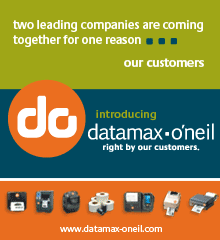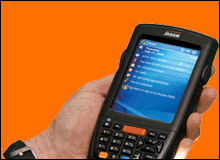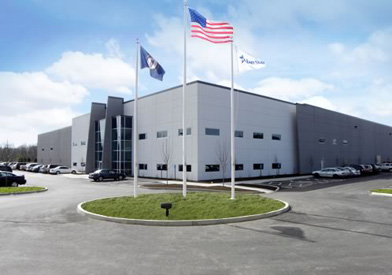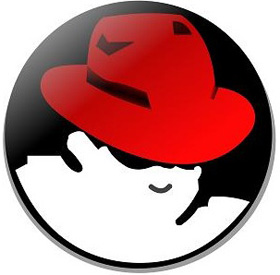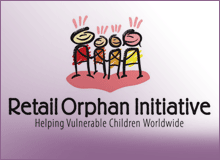
This Week’s Product Pick
Fujitsu Components America (Sunnyvale, CA) presented its new family of stand-alone thermal receipt printers. The printer family consists of the FP510, FP460, and FP360, offering maximum black-and-white print speeds of 260 mm, 210 mm, and 160 mm/second, respectively. A compact footprint with front-feed media delivery minimizes occupied countertop space, and the splash-proof casing adds extra protection in demanding environments such as industrial or healthcare. The printers accommodate variable paper widths of up to 83 mm/3.25 in. with paper roll capacity of 102 mm/4 in. (outside diameter) to reduce paper changes. Especially suited for long-term installations, reliability is rated at 70 million lines (MCBF), 150 km of paper, and two million cuts. Standard features for all three printers include: two-color printing of characters, graphics, and barcodes at 203-dpi resolution; 3-MB user memory; programmable auto-cutter; and drop-in paper loading. Available interfaces, which are user changeable, include serial (RS-232), parallel (Centronics), USB 2.0 Full Speed, and Combo (RS-232C and USB). Additionally, the FP510 offers 10/100 Base-T Ethernet. Fujitsu has set MSRP at: $219 each/1000 quantity for the FP360; $243 each/1000 quantity for the FP460; and $266 each/1000 quantity for the FP510.
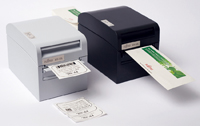
New Thermal Printer Family from Fujitsu Components America
COMPANY BUSINESS BlueStar Moves into New Home BlueStar has relocated its Global Headquarters to Hebron, KY, just three miles from the Cincinnati/Northern Kentucky International Airport. The new facility, located at 3345 Point Pleasant in Hebron, was designed to showcase the distributor’s global reach, range of professional services, and growing environmental awareness. Commented Mark Fraker, BlueStar’s VP of Marketing, “Not only have we expanded our infrastructure with a state-of-the-art distribution center, we have established a new corporate office to facilitate our rapid global expansion.” He described the relocation as “seamless” and noted “zero disruption in operations.” Interestingly, the new facility draws on technologies from many of BlueStar’s vendors. Motorola supplied wireless access ports with hardware and software for the global training center, and Zebra Technologies was instrumental in establishing new wireless close-proximity security systems for the warehouse and offices. With the help of Elo TouchSystems, UnyTouch Manufacturing, and Hewlett-Packard, BlueStar has embraced “place-based media” and “narrowcasting” digital solutions throughout the building for educational, promotional, and customer support purposes. In addition, Datalogic’s high-speed, in-line scanners will dispatch shipments at higher volumes and increase BlueStar’s accuracy to 100% on carrier compliance. The new BlueStar Global Headquarters will allow resellers to take greater advantage of its value-added services, including industry training, customizable marketing programs, and pre- and post-technical support, according to the distributor. The training center can host multiple events simultaneously, including marketing/business development workshops, product education, and solution bundling with best-of-breed software and hardware. To meet growing reseller demand for custom integration and support, BlueStar has expanded its integration and repair center as well as its customer support and call center. “BlueStar’s relocation to a Global Headquarters of this magnitude is emblematic of our character and direction in the present and future global solutions-based distribution market,” summarized Steve Cuntz, BlueStar’s CEO. In earlier discussions with RRN.Com, Cuntz pointed with particular pride to the “green” efforts incorporated into the new facility. BlueStar has expanded its recycling of waste to 70%, for example, and has installed energy-efficient, motion-sensor-based lighting in the warehouse.
The Red Hat Fits Synnex Red Hat (Raleigh, NC), the world’s largest provider of open source solutions, in partnership with Synnex Corporation (Greenville, SC), has launched the Open Source Channel Alliance for VARs and System Integrators. Synnex has signed agreements with the nine founding ISV members to distribute diverse open source applications to its 15,000 resellers, in addition to Red Hat Enterprise Linux and JBoss Enterprise Middleware. Currently, the Open Source Channel Alliance focuses on North American markets, responding to “the surge of demand for open source,” in the words of Roger Egan, Red Hat’s VP of Channel Sales, North America. Charter members of the Open Source Channel Alliance include: Alfresco, EnterpriseDB, Ingres, Jaspersoft, Likewise, Pentaho, Zmanda, Zenoss, and Zimbra. Red Hat has identified this group of companies as providers of enterprise-ready, open source solutions that are supported on Red Hat Enterprise Linux and JBoss Enterprise Middleware. Additional open source ISVs are expected to be added, according to the two parties. “As a long-time Red Hat business partner and Synnex customer, we are excited about the establishment of the Open Source Channel Alliance,” reported Joe Dickman, Managing Director at Vizuri (Chantilly, VA). “Until now, access to the broader set of open source tools hasn’t been available; it was up to the reseller to bring it all together. This alliance will fit that need and serve as the convergence point for market-leading, open source application providers. As such, it will simplify and streamline the process for reselling complete end-to-end solutions through the distribution channel.”
|
Worth Your While
Put RFID 2 WRK
RFID Journal Live
April 27-29
Orlando
KioskCom
(Self-Service Expo & Digital Signage Show)
JD Events
May 6-7
Las Vegas
5th Annual Partner Invitational
Ingram Micro Data Capture/POS Division
May 12-14
Phoenix
NRA Show
National Restaurant Association
May 16-19
Chicago
NACStech
National Association of Convenience Stores
May 18-20
Grapevine, TX
RetailNow 2009
Retail Solutions Providers Association (RSPA)
July 11-16
Las Vegas
VARTECH 2009
BlueStar
August 13-15
Nashville, TN
ALL IN THE FAMILY
CipherLab Frees the 1500
CipherLab (Plano, TX) shipped its 1500 Series BT wireless handheld scanners, which provide communication capabilities of up to 90 meters (295 feet)—unleashing workers to get more done in more places, according to the company. The 1500 Series offers the choice of two readers: linear imager for the Model 1560 and laser for the Model 1562. Both employ the company’s innovative three-in-one stand, which enables the scanners to be wall-mounted, placed on the desktop, or elevated for auto-sense scanning.
The three-in-one communication stand can serve up to seven scanners, boosting productivity at the checkout counter, the manufacturing line, or other high-usage environments. The pair of BT wireless scanners features capacity for up to 256 scans in buffer memory when out of range, the capability to record more than 32,000 scans in batch mode, and up to 10 hours of battery life. The Model 1560 linear imager scans and decodes barcodes at up to 200 times per second, eliminating rescans and keeping up with the fastest manufacturing and warehousing operations, according to the company.
“In 2003, CipherLab launched the world’s first BT-enabled handheld scanner,” observed Sherman Chuang, President of CipherLab. “Since then, we’ve become the BT market leader and continue to refine our scanners to set the industry benchmark for customer satisfaction, value, and reliability. By un-tethering employees, the 1500 Series BT scanners boost worker efficiency, particularly in large work areas where data collection applications are critical.”
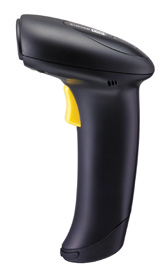
CipherLab’s 1500 Series BT Wireless Scanner
CognitiveTPG Cuts Ribbon on Kiosk Printers
CognitiveTPG (Lincolnshire, IL) unwrapped its new product line of thermal kiosk printers, Models K798 and K799, incorporating the same platform technology as its A798/A799 POS receipt printers. The new kiosk printers employ an exclusive full-steel modular frame to withstand harsh environments and facilitate kiosk construction and maintenance, according to CognitiveTPG. A compact clamshell format provides design flexibility and access to common areas required for media loading and maintenance.
The pair of printers supports monochrome (K798) and two-color/monochrome (K799) print technology, with 203-dpi print resolution and print speeds of 150 mm/second for the K798 and 250 mm/second for the K799. A self-sharpening, rotary, ceramic auto-cutter knife achieves minimum service life of 2.3 million paper cuts, 50% longer than many competitive offerings, the company reported. In combination with the 200-kilometer (7.8 million inches) print head, this unique feature allows the new kiosk printers to deliver state-of-the-art performance and reliability.
“With the growing significance of the self-service sector, CognitiveTPG designed this printer mechanism that can work in kiosk applications as well as in our single-station Point of Sale unit,” commented Jose Basa, Director of New Product Development at CognitiveTPG. “The modular design allows us to offer the service, flexibility, and reliability that our POS customers have enjoyed for over 20 years.”
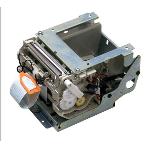
Kiosk Printer’s Self-Sharpening Ceramic Auto-Cutter Provides 2.3 Million Cuts
[Editor’s Note: CognitiveTPG has also released its EZ-LP four-inch direct thermal barcode printer, intended as the replacement for legacy desktop label printer installations. “We designed the EZ-LP to combine durability and reliability with enhanced emulations and industry standard communication interfaces at an attractive price point,” said Roman Dziaba, Product Manager.]
Join the Party at No Charge
Do you need to reach the POS & Auto ID resellers who really drive business—in the most targeted editorial environment, and on the most cost-effective basis?
E-mail Michael
Kachmar for advertising information,
or call 973-270-3284
Did you miss one of our issues and suddenly realize your competitors know more than you do?
Hurry ! Use the links below to catch up :
STARTS & STOPS
Ringing Up Support for Opticon’s Smartphone
Opticon Mobility Solutions (Orangeburg, NY and Renton, WA) announced extended support for its Windows Mobile Smartphones sold in the U.S. The new program will be called Opticon Total Care and will be sold by Certified Opticon Service Providers. While Opticon’s standard warranty covers two years, Total Care will provide for extended years of service “in a totally integrated support solution,” according to the company.
Opticon Mobility Solutions U.S. Sales Manager, Jay Lauer, said that “our extended service agreement provides customers with a committed response time and the ability to lock in repair budgets for the length of the agreement.” In comparison to Opticon’s standard warranty, which covers only defects in materials and workmanship, the new service agreement provides comprehensive support by covering damage occurring in the mobile workplace, Lauer added. (With more and more devices and functions becoming mobile, such comprehensive coverage has become critical, sources tell RRN.Com.)
Opticon’s H19 Smartphone combines Windows Mobile 6.0, integrated GPS, Quad-band GSM/GPRS/Edge voice and data, Wi-Fi (802.11 b/g), and Bluetooth into its compact form factor. In addition, the rugged, IP54-rated H19 features the choice of high-speed, integrated laser scanner (100 scans/second) or 2D imager and 512 MB of ROM for high-volume data storage. Target applications include field service, field sales, and route delivery.
![]()
Opticon’s H19 Smartphone with Scanning
Checkpoint Can See for Miles
Checkpoint Systems (Thorofare, NJ) introduced its Merchandise Visibility Solution, which seeks to provide retailers with RFID-based tracking and control of apparel and other goods throughout the entire supply chain, or from “source to store.” For the solution, Checkpoint brought together the following elements: RFID software from Checkpoint’s OATSystems Division, delivering information management and real-time event processing to automate and error-proof the entire supply chain; RFID tags delivered to the point of manufacture and applied at the source, through Checkpoint’s Check-Net Service; shrink management solutions, including the portals and readers needed to track inventory; and, lastly, installation services for all of the equipment .
“Checkpoint’s Merchandise Visibility Solution enables retailers to improve their supply chain and in-store operational effectiveness in ways never before possible,” claimed Rob van der Merwe, Chairman, President, and CEO of Checkpoint Systems. “It positions retailers to gain unprecedented visibility to reduce out-of-stocks, reduce shrink, and reduce working capital, all while improving the consumer’s experience and increasing sales.” In making the announcement, Checkpoint cited industry studies that show retailers’ inventory numbers are accurate only 35% to 45% of the time and merchandise is out of stock 10% to 12% of the time.
Checkpoint also announced that its OAT Foundation Suite Version 6.3 has achieved SAP Certification, meaning customers can now integrate their real-time RFID data with SAP enterprise business processes. In addition, OATSystems has joined the SAP PartnerEdge program as an SAP software solution partner. “We look forward to addressing mutual customers’ needs and delivering real business value for them,” shared Prasad Putta, GM of OATSystems (Waltham, MA).
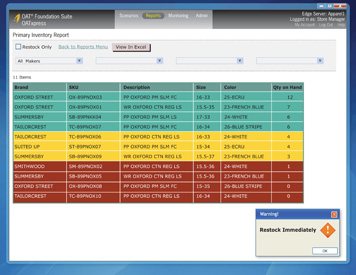
RFID Drives Checkpoint's "Source to Store" Merchandise Visibility Solution
Code
Corner
Cornell-Mayo Associates (Parsippany, NJ) released its Lookback Regression Tester in support of its Opus Millennium and Omnistore POS software packs. The new solution enables retailers to respond more quickly to business requirements by increasing the speed of implementation and enhancing the quality of software updates, according to the developer. Lookback allows for easy verification that the sales application is functioning as expected. Users can manually key the test plan, after which the saved plans are played back on the register to simulate the keying of the transactions. Results of the original and playback recordings can then be compared using automated tools provided as part of the package. “Lookback is one more thing that sets us apart from other POS vendors,” offered Gene Cornell, President of Cornell-Mayo Associates. “We have already received strong interest in this simplified and more accurate Quality Assurance feature from several of our vendors.”
[Editor’s Note: McAfee (Santa Clara, CA) has announced that it has entered into a global reseller agreement with Hewlett-Packard. Through this agreement, HP will resell McAfee’s entire line of enterprise security products and services. “The complexities of today’s threats and turbulent economic times call for agreements of this kind, where products from multiple vendors are combined to maximize our customers’ existing investments and lower operational costs,” indicated Roger King, EVP of Worldwide Channel Operations at McAfee.]
ALLIANCES
Nautech Sweetens Honeywell’s Solutions
Honeywell Scanning & Mobility (Skaneateles Falls, NY) now offers Naurtech’s CETerm Web Browser and Terminal Emulation Software, both direct from Honeywell and through its network of partners. This pairing simplifies purchasing for customers and provides an integrated solution for connecting to back-office mainframe systems and Web applications, according to the two parties. Tailored for retail and warehouse environments, CETerm comes for Honeywell’s Dolphin 7600, 7850, 7900, 9500, and 9900 mobile computers, as well as the IK8560/70. The software can be factory-installed on the Dolphin 7850 and 9900 for faster implementation and deployment.
“This business relationship with Naurtech was formed based on the quality of CETerm and the needs of our customers,” stated Sankar Ghosh, Manager of Software and Services Marketing for Honeywell Scanning & Mobility. “We want to ensure that purchasing, licensing, and distributing our products and the software that helps to drive those products is easier for our customers.”
CETerm from Naurtech (Issaquah, WA) includes Web browser and terminal emulators specifically designed for data collection applications utilizing barcode technology. Five concurrent sessions can be configured to connect to any Web application or legacy host systems requiring 3270, 5250 or VT220 emulation. CETerm supports secure transmissions via SSH/SSL, as appropriate, using strong encryption algorithms such as AES-256 and Blowfish, for environments that handle sensitive data. The software’s built-in scripting allows integrators to automate business tasks and build customized applications that facilitate control of device peripherals and operating system functions, according to the developer.
Zipthru Rewards Charted by Agilysys
Agilysys (Cleveland) has partnered with Compass Group North America (Charlotte, NC), one of the leading foodservice management companies in the U.S., to deliver an innovative loyalty solution that rewards purchases and even drives better eating habits. The Zipthru Rewards solution by Compass Group targets corporate cafes and dining centers. The solution is fully integrated, down to the item SKU level, with InfoGenesis POS by Agilysys, enabling promotions to be built around item-specific purchasing behavior. With Zipthru Rewards, customers earn points for purchases, which they can later redeem for free meals, discounts off future purchases, or other rewards. It also integrates with the InfoGenesis cashless, stored-value solution, dubbed eCash.
Zipthru Rewards was recently implemented at a large manufacturing facility in the Midwest, according to the two parties. The company, which sponsors an initiative for nutritional dining, employs the solution to encourage cashless payment and to promote healthy eating habits. Employees are rewarded for every cashless transaction, but earn double points for making selections from the Compass “Balanced Choices” menu, under the belief that healthier employees are more content and productive.
“We have enjoyed a long relationship with Compass Group and are pleased to partner with them to deliver this ground-breaking solution to their clients,” declared Tina Stehle, SVP and GM of Agilysys Hospitality Solutions Group. “We have combined the best aspects of our industry-leading POS system with this unique loyalty application to enable clients in the managed foodservice sector to offer exciting new dining options to customers. The result is technology that increases participation, engenders loyalty, and enhances customer satisfaction. It’s a winning combination for everyone.”
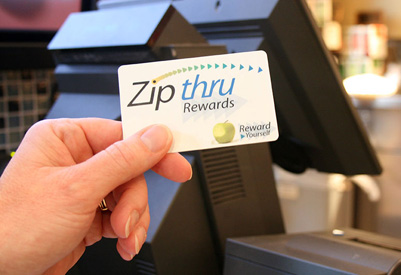
Loyalty Solution Also Seeks to Improve Eating Habits
Key
Advertiser
Links
Be sure to visit these vendors for the latest in channel products and offers for resellers.
POS & Auto ID Distribution
BlueStar
M-S Cash Drawer
POS & Peripherals
Pioneer POS
POS-X
Barcode & Mobile Printers
Datamax-O'Neil
Cash Drawers
MMF Cash Drawer
Data Collection Software
Wavelink
Data Collection Terminals
CipherLab
Datalogic
Mobile
Janam Technologies
Motorola
Integrated Payment Solutions
Datacap Systems
Payment Engine Solutions
Precidia Technologies
Receipt
Printers
Star Micronics
Retail Software
Toshiba TEC
Screen Protection
3M Optical Filters
Video Surveillance & Access Control
ScanSource Security
HELLO GOODBYE
New VP to Herd Sales for Zebra
Zebra Technologies Corporation (Vernon Hills, IL) has hired Sharon Brindley as its VP, North American Sales, for Specialty Printing Solutions. She started work last week, and reports to Fred Zaeske, VP and GM of Zebra SPS North America.
Brindley brings more than 20 years of executive-level experience to the Zebra SPS Business. Prior to joining Zebra, she served as VP of U.S. Business Channels and SMB at Lexmark International. While at IBM Corporation, Brindley worked as District Manager, and later at Lexmark, served as VP, Public Sector and Healthcare, and VP, Financial Services, in addition to a number of other leadership roles.
“Sharon’s channel and broad vertical market expertise, along with her track record of solid sales results, is the perfect match for Zebra,” Zaeske said. “Sharon understands how strong channel partnerships contribute to business success and how they support our goal to maintain and enhance our industry-leading PartnersFirst channel program. We are excited to have Sharon join our North American leadership team and look forward to her adding significant value to our organization.”
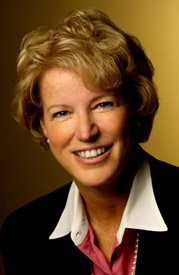
Sharon Brindley, VP, North American Sales, Zebra SPS
Miller Seated at TableTop Media
TableTop Media (Dallas), which offers the “Ziosk” touchscreen POS and entertainment system for hospitality, has added David Miller, founder of JTECH Communications, as Partner. Miller will lead the go-to-market strategy for the Ziosk solution for casual dining, fast casual, quick-service, and airports and hotels. He brings more than 30 years of business strategy, technology, and restaurant industry experience to TableTop Media.
“Dave is one of the most admired and well-liked ambassadors of our industry,” stated Jack Baum, CEO of TableTop Media. “His exceptional track record shows exemplary dedication, expertise, and leadership in working with some of the biggest and best-known restaurant brands to develop and deliver technology solutions to the restaurant industry.”
JTECH pioneered the use of paging systems to help restaurants alert guests that their tables are ready. In 2005, Miller sold JTECH to Micros. Today, JTECH guest and server paging systems are used in more than 60,000 locations worldwide and by an estimated two million consumers on any given weekend. Commented Miller: “When I reviewed the TableTop Media offering, I immediately knew this was a game-changing and innovative solution that would revolutionize the casual dining experience. I have spent a number of years working in and with the restaurant industry, and I’m excited to be part of this team that will forever change the guest experience.”
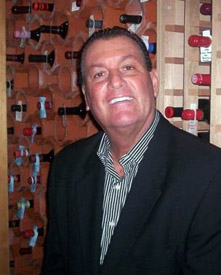
David Miller, Partner, TableTop Media
Channel Factoid
In addition to the challenging economy, restaurant operators are also dealing with shifting customer demographics as parents decide to leave their kids at home, and young adults, ages 18 to 24, cut back on restaurant visits, according to The NPD Group (Port Washington, NY). NPD’s Crest, which has tracked consumer purchasing and consumption patterns at quick-service and full-service restaurants since 1975, shows that in 2008, visits by parties with kids declined by 3% and visits by young adults—the most lucrative restaurant market—dropped from 254 per capita in 2007 to 233 in 2008. The increasing absence of children can be attributed to cost-cutting on the part of their parents, NPD suggests, and should reverse course when the economy improves. Young adults, however, have been scaling back on restaurant visits for the past five years, due to shifting preferences for healthier, well-prepared food. One group that has increased their visits to restaurants over the past year is Baby Boomers, ages 50 to 64, according to NPD’s foodservice market research. In 2008, the number of per capita visits by the Boomers was 209, up from 204 in 2007 and 201 in 2003.
STANDARDS
NRF Calls PCI “An Elaborate Patch”
The National Retail Federation (Washington), in recent testimony before Congress, described PCI Standards as only “an elaborate patch,” and recommended, once again, that retailers not be required to store credit card numbers in the first place. The hearing was held on March 31 by the House Homeland Security Committee’s Subcommittee on Emerging Threats, Cybersecurity, and Science and Technology. It sought to determine whether in fact PCI Data Security Standards mandated by Visa, MasterCard, and other major credit card companies reduce “cybercrime.”
“All of us—merchants, banks, credit card companies, and our customers—want to eliminate credit card fraud,” testified David Hogan, NRF’s SVP and Chief Information Officer. “But if the goal is to make credit card data less vulnerable, the ultimate solution is to stop requiring merchants to store card data in the first place. The bottom line is that it makes more sense for credit card companies to protect their data from thieves by keeping it in a relatively few secure locations than to expect millions of merchants scattered across the nation to lock up their data for them.”
“PCI is little more than an elaborate patch,” continued Hogan. “While PCI can reduce some fraud—at extraordinary cost—it is not nearly as effective as the redesign of the card processes themselves. Retailers have been required to take extraordinary steps to ensure that somewhere, somehow, data is not inadvertently being retained by software. However, what is ironic about this scenario is that the credit card companies’ rules require merchants to store for extended periods credit card data that many retailers do not want to keep.” Merchants are not required to keep card information, as RRN.Com readers know, but risk charge backs when purchases are disputed and receipts can’t be produced.
Under the NRF’s scheme, first proposed to the PCI Security Standards Council in 2007, retailers would have the option of letting card companies and banks store the information instead. Retailers who choose to participate would only have to keep a transaction authorization code and a truncated receipt without the customer’s full credit card number. Credit card companies would agree to accept the code and truncated receipt as proof of any disputed purchases. Doing so would eliminate the risk of hackers stealing data from participating retailers because the retailers would no longer hold the information, Hogan explained. The NRF’s proposal, needless to say, was not adopted.

David Hogan, SVP and CIO, National Retail Federation
PinPoint Media
All Rights Reserved


